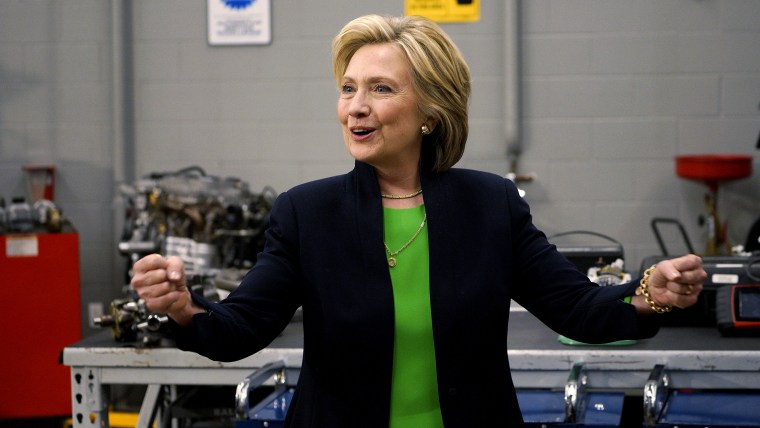As Hillary Clinton readied her 2016 presidential campaign, the complaints from some of her more liberal critics were hardly surprising. Many on the left feared, for example, that the former senator from New York would be too cozy with Wall Street -- concerns that have fueled interest in Sen. Elizabeth Warren's (D-Mass.) agenda.
But Bloomberg Politics reported yesterday on a familiar sight: one week into her candidacy, Clinton is already striking pretty populist tones.
Hillary Clinton is likely months away from offering policy proposals on taxes and financial regulation, but she hinted on Monday that she hopes to get tougher on traders and reexamine the capital gains tax. Clinton said at a small business roundtable here that she plans to "take a hard look at what is now being done in the trading world, which is just trading for the sake of trading."
These comments came just four days after Clinton tapped Gary Gensler, a "former top federal financial regulator and strong advocate for strict Wall Street rules," to be her campaign's CFO.
Matt Yglesias noted last week, "This is, for Wall Street skeptics, a huge deal: Gensler is the kind of regulator a President Elizabeth Warren would be expected to pick, not a President Clinton. But if Clinton is going to pick the kinds of regulators Warren was going to pick, then the difference between them isn't as large as many thought."
What's more, let's not forget Clinton's comments in Iowa last week, when she complained of the growing wage gap in corporate America, and took aim at the carried-interest loophole that Wall Street loves and benefits from: "[T]here's something wrong when hedge fund managers pay lower tax rates than nurses or the truckers that I saw on I-80 as I was driving here over the last two days."
Remember, this is all coming from the candidate who's believed to be too close to the financial industry.
To reiterate a point from last week, the fear among many on the left was that Clinton, without facing any real pressure from a primary challenger, would aim for the center and effectively run a general-election campaign for a year and a half. No one would pull the former Secretary of State to the left, so she simply wouldn't bother.
And while Clinton's candidacy is still in its infancy, and many of her pronouncements aren't yet shaped by policy details, it's not unreasonable to think she's already positioning herself as a surprisingly progressive candidate, giving Warren backers plenty to be happy about.
The more the presumptive Democratic nominee embraces progressive ideals, the less I suspect we'll hear about the need for a competitive Democratic primary.
